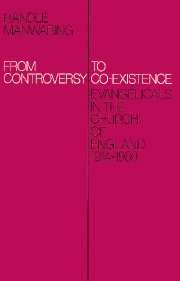Book contents
- Frontmatter
- Contents
- Acknowledgements
- Preface
- 1 Into battle
- 2 The defensive years
- 3 Through the Waste Land
- 4 Continuing nadir
- 5 The turning tide
- 6 Towards the conversion of many
- 7 Flood-tide of Evangelism
- 8 Anatomy of Evangelicalism
- 9 The Fundamentalist issue
- 10 The hard facts of Evangelicals and unity
- 11 The Honest to God debate
- 12 Liturgical debates
- 13 Charismatic differences
- 14 Keele – a watershed
- 15 Evangelical identity – a problem
- Notes
- Index
14 - Keele – a watershed
Published online by Cambridge University Press: 18 September 2009
- Frontmatter
- Contents
- Acknowledgements
- Preface
- 1 Into battle
- 2 The defensive years
- 3 Through the Waste Land
- 4 Continuing nadir
- 5 The turning tide
- 6 Towards the conversion of many
- 7 Flood-tide of Evangelism
- 8 Anatomy of Evangelicalism
- 9 The Fundamentalist issue
- 10 The hard facts of Evangelicals and unity
- 11 The Honest to God debate
- 12 Liturgical debates
- 13 Charismatic differences
- 14 Keele – a watershed
- 15 Evangelical identity – a problem
- Notes
- Index
Summary
Conferences have always been part of the evangelical scene and at the annual Keswick Convention, Anglicans have been much in evidence, often playing the leading part. Moreover, the Islington Clerical Conference, previously held in January, has been a most important platform for Evangelical Anglican thought and has attracted clerics from all over the country. Not so well known, perhaps, but very influential, was the Oxford Conference of Evangelical Churchmen arranged for many years by Church Society. More serious study was possible at this residential gathering which, sadly, lapsed in the 1970s, to be succeeded, in a way, by the Protestant Reformation Society's annual get-together and, to some extent, by the annual Senior Evangelical Anglican Clergy conference, held at Swanwick. These were all most important occasions but relatively ‘parochial’ compared with the National Evangelical Anglican Congress held at Keele University in April 1967, for which plans were being made two years beforehand when the title ‘Christ Over All’ was projected. (Subsequently, from 1983 the Anglican Evangelical Assembly gained the position of pre-eminence in the calendar and eclipsed Islington.)
The Anglican Church was undergoing a slow change from being ‘the Conservative Party at prayer’, with its set patterns of liturgy and government, to a much freer set-up with more lay participation and new experimental forms of worship. In all this, Evangelicals were not being left behind, many of them feeling restive in the old structures.
- Type
- Chapter
- Information
- From Controversy to Co-ExistenceEvangelicals in the Church of England 1914–1980, pp. 174 - 190Publisher: Cambridge University PressPrint publication year: 1985



